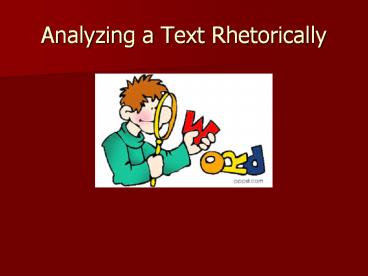Analyzing a Text Rhetorically - PowerPoint PPT Presentation
Title:
Analyzing a Text Rhetorically
Description:
... Arial Wingdings Slit 1_Slit Analyzing a Text Rhetorically Definition of a Text The Red Wheelbarrow by William Carlos Williams PowerPoint ... – PowerPoint PPT presentation
Number of Views:129
Avg rating:3.0/5.0
Title: Analyzing a Text Rhetorically
1
Analyzing a Text Rhetorically
2
Definition of a Text
- A set of symbols that communicates or means
something. A text can be read and interpreted. - From the Latin root, texere, meaning to weave
3
(No Transcript)
4
(No Transcript)
5
(No Transcript)
6
(No Transcript)
7
Significant Texts in our Lives Can be Analyzed
- Religious texts
- Political texts
- Legal texts
- News articles
- Advertisements
- Songs
- Poetry
- Photography
- Personal experiences
- Dreams
- Historical documents
- Academic articles
- Memories
- Speeches
- Films
- Books
- Video games
- Performances
- Bodies
- Clothes
8
Textual Analysis
- What does the term analysis mean to you?
9
Analysis
- Breaking something down into its essential parts
to understand how and why those parts work
together to accomplish something (what how and
why) - Versus summary (what)
- Importance of structure
- Looking at the relationships between the parts
- Challenging binary oppositions
10
Step 1 Breaking down into essential parts
11
Step 2 Determining how parts work together
12
Step 3 Determining what is accomplished when
parts work together
13
Analysis Involves Interpretation
- Analyze To break something down into its
essential parts to determine how those parts work
together to accomplish something.
We can all see the same parts of the same text
working together in the same way, yet we each see
it accomplishing something different.
Or perhaps we all see a text accomplishing the
same thing, but see it doing so in different
ways.
14
(No Transcript)
15
(No Transcript)
16
(No Transcript)
17
(No Transcript)
18
(No Transcript)
19
There are no wrong or right interpretations
of a text.
Its a duck!
Its a bunny!
But there are supported and unsupported
interpretations (quotations).
Its a tractor!
20
Rhetoric
- What does the term rhetoric mean to you?
21
Defining Rhetoric
- The language both written and visual that
speakers and writers use to communicate or
persuade. - The study of that language, human interaction,
and communication.
22
Analyzing a Text Rhetorically
- Breaking down a text into its essential parts to
understand how those parts work together to
accomplish something - Rhetorical analysis involves looking at the
context, or the rhetorical situation, in which
the communication takes place.
23
Parts of a Rhetorical Situation
24
Reading Rhetorically
- Reading like a writer reading the text as a
series of choices. - Understanding how the author(s) constructed the
text and why the author(s) made certain choices
about the text. - Understanding context as well as content.
25
Questions for Rhetorical Analysis
- Who is the author/speaker?
- What is the purpose of writing? What is the
occasion that gives rise to the writing? - Who is the intended audience?
- What is the main argument?
- What does the nature of the communication reveal
about the culture(s) that produced it?
26
Lets Practice!
27
(No Transcript)
28
(No Transcript)
29
(No Transcript)
30
Schools of Thought or Theories
- Formalists (symbols)
- Gender theorists (gender, sexuality)
- Marxist theorists (social class)
- Race-based theorists (race)
- New Historicism (history)
- Post-colonial theorists (nationality, empire)
- Psychoanalytical theorists (unconscious)
- Disability theorists (disability)
- Happiness theorists (happiness)
- Rhetoricians (rhetorical situations, language)
31
Different Schools of Thought or Theories
- Importance of close reading, quoting, and
explaining your interpretation of the quotes - Ex. We hold these truths to be self-evident,
that all men are created equal, that they are
endowed by their Creator with certain unalienable
Rights, that among these are Life, Liberty and
the Pursuit of Happiness (Declaration).































